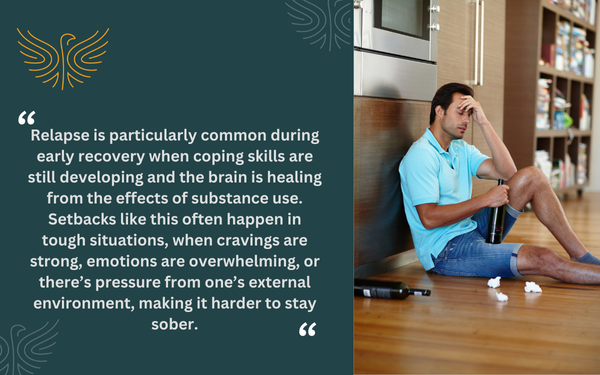For many individuals, maintaining sobriety is a lifelong commitment that requires ongoing effort, support, and awareness. While completing a rehabilitation program is a significant achievement, the path to lasting recovery often includes challenges and potential setbacks - including relapse.
Relapse is commonly misunderstood as a failure. In reality, it’s part of the recovery process for many individuals. In fact, between 40-60% of people in recovery experience at least one relapse. The truth is that recovery isn’t always linear.
In this article, we look at the most common triggers that can lead to relapse after rehab and how to recognize early warning signs.
_______________________________________________________
What Is Relapse?
Relapse in addiction recovery refers to a return to substance use after a period of abstinence1. However, it’s important to distinguish between a lapse - a brief, one-time use of substances - and a full relapse, which involves a return to regular patterns of substance abuse and addictive behaviors.
Relapse is particularly common during early recovery when coping skills are still developing and the brain is healing from the effects of substance use. Setbacks like this often happen in tough situations, when cravings are strong, emotions are overwhelming, or there’s pressure from one’s external environment, making it harder to stay sober.

_______________________________________________________
What Is the Most Common Trigger for Relapse?
Across all types of addictions, stress is the most common trigger2. Research consistently shows that people in recovery are especially vulnerable to stress—particularly during early sobriety—because many relied on alcohol or drugs to cope with life’s pressures and emotional discomfort.
Stress can come from many sources. Common triggers include:
- Financial strain (such as debt or unexpected expenses)
- Relationship issues (like arguments, breakups, or divorce)
- Health problems (chronic pain or new diagnoses)
- Challenges at work (job loss or conflict)
- And major life changes (such as moving or changing careers).
Without healthy coping strategies, these stressors can quickly feel overwhelming. This is why learning new ways to manage stress is crucial for lasting recovery. Evidence-based stress-reduction approaches used in treatment to address and prevent this include cognitive-behavioral therapy (CBT), mindfulness, physical activity, connecting with supportive people, and joining peer support groups where stress management tools are shared.
_______________________________________________________
Other Common Triggers for Relapse
Stress isn’t the only factor that can lead to relapse. Other common triggers for relapse include environmental cues, negative emotions, overconfidence, social pressure, and physical pain or illness3. Below, we take a closer look.
Environmental Cues
Being in the same places or around the same people who were linked to previous substance use can be a powerful trigger. Common environmental triggers include passing by bars or locations where substances were purchased or used, encountering drug paraphernalia, or even returning to neighborhoods associated with previous use. Even similar or the same sights, smells, and sounds can lead to cravings and use.
Thus, as part of relapse prevention, it’s often recommended to avoid high-risk situations and change your environment to support healthy habits and recovery.
Negative Emotions
Difficult emotions like anger, sadness, guilt, shame, and loneliness present substantial challenges in recovery. Many individuals initially turned to substances specifically to numb or escape these uncomfortable feelings, creating an automatic association between emotional distress and the desire to use.
When these emotions arise during recovery, they can trigger intense cravings as the brain remembers substance use as a quick (while unhealthy) solution. Throughout recovery, learning to sit with and process difficult emotions without turning to substances is imperative. This frequently requires developing new emotional regulation skills through therapy, mindfulness practices, and honest communication with trusted loved ones.
Overconfidence or Complacency
As time passes in recovery, some individuals begin to feel they’ve “beaten” their addiction or that they’re “cured,” leading to dangerous complacency. This overconfidence can manifest as skipping therapy appointments, gradually disconnecting from support groups, or convincing oneself that just one drink or hit or occasional use is manageable.
This mindset is particularly dangerous because it often leads to gradual boundary-testing that can quickly escalate into full relapse.
Social Pressure
Social situations can present significant challenges to recovery, especially when they involve people who don’t understand addiction or who may inadvertently (or sometimes intentionally) undermine recovery efforts.
For example, holiday gatherings, weddings, work events, and reunions with old friends can be especially challenging. Preparing for these situations by having prepared responses, bringing a sober companion, or having an exit strategy can help navigate social pressure. In fact, many in recovery find it helpful to role-play such challenging social scenarios with therapists or support group members before encountering them in real life.
Physical Pain or Illness
Even legitimate medical conditions requiring pain management can inadvertently trigger a return to substance use. Illness and injury can also increase vulnerability by disrupting healthy routines, causing sleep deprivation, and adding emotional stress.
This means that those in recovery should work closely with healthcare providers who understand addiction medicine and are aware of their recovery status. Alternative pain management approaches, non-narcotic medications, and extra support during periods of illness are often essential components of maintaining recovery, especially during pain or health challenges.
_______________________________________________________
Relapse Warning Signs
Relapse rarely happens suddenly - it typically develops in stages, with recognizable warning signs appearing well before actual substance use resumes. Common warning signs include4:
- Isolation from support systems
- Neglecting self-care routines
- Romanticizing past substance use
- Experiencing increased irritability or mood swings
- Denying or minimizing the severity of the addiction
- Reconnecting with people from one’s past
Physical symptoms like sleep disturbances, changes in appetite, or unexplained anxiety may also signal increased vulnerability. Ultimately, reducing relapse risk involves creating a comprehensive prevention plan that addresses personal triggers, builds strong coping skills, and establishes a reliable support network. Regular therapy, consistent participation in support groups, maintaining physical health, practicing stress management techniques, and having emergency contacts ready can significantly strengthen recovery resilience.
At Freedom Recovery Centers (FRC), we’re here to help. Our team provides personalized support and evidence-based strategies for managing triggers and preventing relapse. If you have any questions or need assistance navigating the challenges of recovery, call us at 804-635-3746 or fill out our online form.
.svg)






.svg)

.svg)



.svg)
